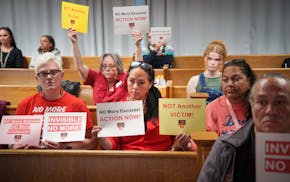Opinion editor's note: Strib Voices publishes a mix of guest commentaries online and in print each day. To contribute, click here.
•••
In global discussions of China's economic transformation, narratives often celebrate GDP growth, trade surpluses and technological prowess. But beneath this glittering ascent lies a less-told story — one of human dislocation, broken promises and generational pain. My family's experience reveals a deeper truth: that political decisions, especially in an authoritarian system, reshape not only economies but the emotional architecture of ordinary lives.
My father was a child during the Great Leap Forward, a national campaign that resulted in one of the deadliest famines in human history. His parents — my grandparents — starved to death. At an age when most children are still under their parents' care, he was thrust into the role of guardian, raising two younger sisters in a country gripped by ideological fervor, scarcity and death.
Beginning at 16 years old, he started working in China's state railway system. It was steady, respected and — at the time — part of the foundation of a planned economy where job security was guaranteed. The work was incredibly dangerous — my father lost the small finger on his left hand in an accident during railway construction, a time when many workers lost their lives building rail lines into the mountainous Sichuan province. Still, he was proud of those difficult years and the sense of purpose they gave him.
But he left that position in 1984 for a more unified family life, joining a state-owned electronics factory where my mother worked. This was not a reckless move — the factory was thriving, bolstered by government support. Then, in the 1990s, market reforms accelerated. The factory was bankrupted, my parents laid off and the safety net vanished. Meanwhile, his former railway colleagues prospered in the reform era.
What followed for my father was not just economic hardship, but a profound psychological unraveling. Once disciplined and stoic, he became volatile and unstable. He lashed out at family members, refused modern medicine and rejected balanced food. He grew obsessed with traditional herbal remedies and cursed political leaders obsessively. His recurring rambling was something like this, "I need to tell Hu Jintao/Jiang Zemin, how we made revolution, how we ate bitterness, shed blood and nearly died many times on the Cheng-Kun railway." He spiraled into isolation, alcoholism and despair, eventually dying suddenly in his sleep, never having received a diagnosis or treatment.
He was not alone. Millions of workers — particularly those in shuttered state-owned enterprises — faced a similar fate. Many had trusted in a system that abruptly abandoned them. Their labor was no longer valued; their identities became obsolete overnight. These were not abstract economic reforms. They were ruptures in real lives.
My maternal grandfather made a similar bet on the system. He was a gifted teacher who rose to be a headmaster of a primary school in the 1960s but left his profession after witnessing how intellectuals were demeaned. He believed the Communist Party's claim that workers were the backbone of the revolution. So he became a factory worker — and encouraged all his children to do the same. When the reforms came, his factory too was dismantled. He and his children were laid off, their decades of labor compensated with almost nothing. Unlike my father, he accepted it quietly. But both men were shaped — and shattered — by the same broken trust.
The Western world often views China's rise as an economic miracle. But miracles rarely account for the dead ends, the collateral damage, the internal migrations of shame and silence. In our case, the damage was intergenerational — not only financial, but emotional. My father did not live to see his story understood. But I carry it forward as witness and warning.
As the world reconsiders how to engage with China — economically, strategically, ethically — we must not lose sight of the people beneath the policy. Economic success measured by metrics alone masks a more complex truth. Progress without dignity is a fragile kind of triumph. And for millions of families like mine, the cost of reform was far more than any ledger can record.
Hu Zeng is a Chinese-born biomedical researcher working at the Mayo Clinic in Rochester. The opinions expressed here are not intended to reflect those of his employer.
Editorial Board Cheers & Jeers: Online tools are transparent when the air isn't

Brehm: Alpha News deserves respect from its competitors
Opinion: Partnering with Minnesota's foragers is essential to creating sustainable regulations
